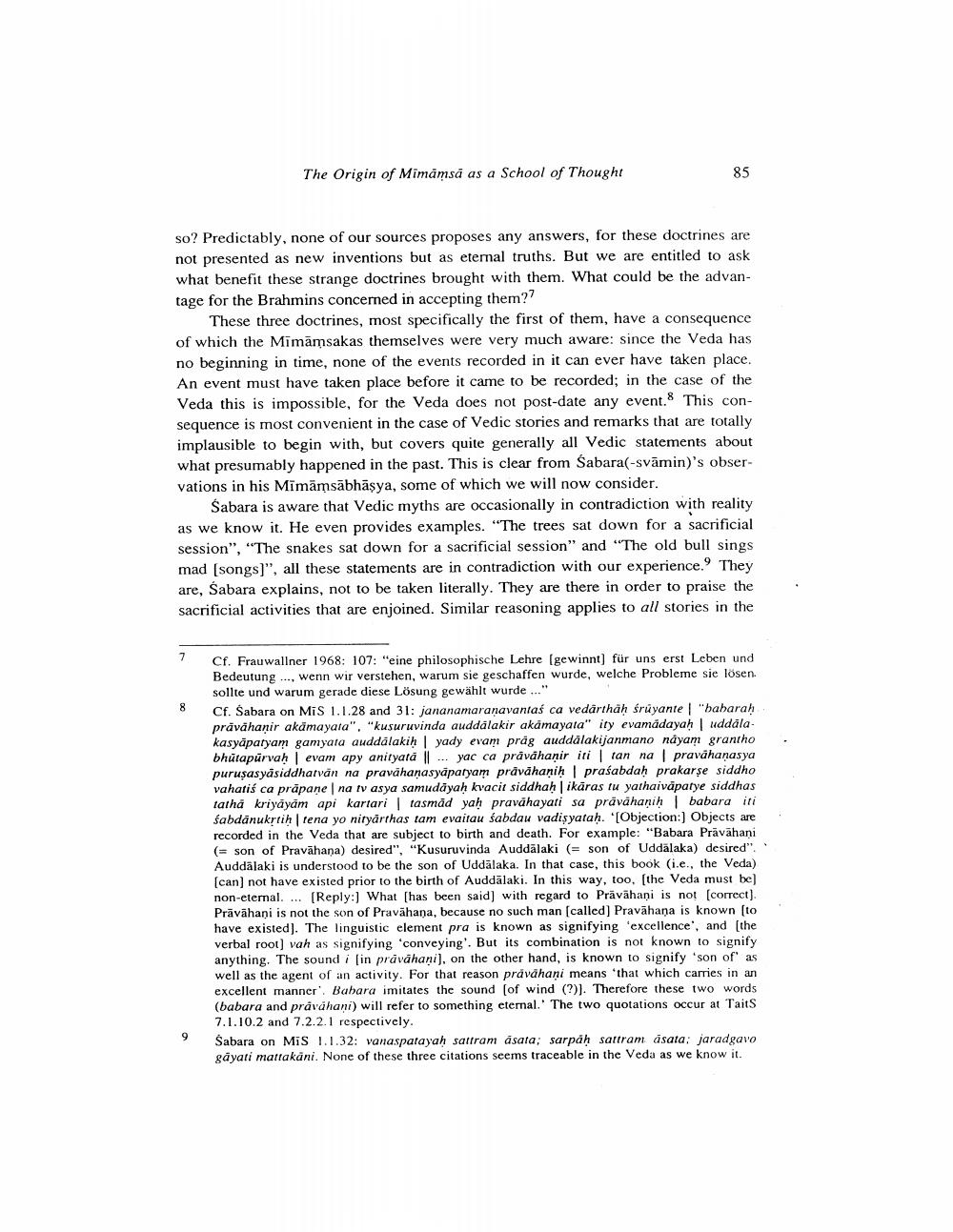Book Title: Origin Of Mimamsa As A School Of Thought A Hypothesis Author(s): Johannes Bronkhorst Publisher: Johannes Bronkhorst View full book textPage 3
________________ The Origin of Mimämsä as a School of Thought 85 so? Predictably, none of our sources proposes any answers, for these doctrines are not presented as new inventions but as eternal truths. But we are entitled to ask what benefit these strange doctrines brought with them. What could be the advantage for the Brahmins concerned in accepting them?? These three doctrines, most specifically the first of them, have a consequence of which the Mimamsakas themselves were very much aware: since the Veda has no beginning in time, none of the events recorded in it can ever have taken place. An event must have taken place before it came to be recorded; in the case of the Veda this is impossible, for the Veda does not post-date any event. This consequence is most convenient in the case of Vedic stories and remarks that are totally implausible to begin with, but covers quite generally all Vedic statements about what presumably happened in the past. This is clear from Sabara(-svāmin)'s observations in his Mimāmsābhāşya, some of which we will now consider Sabara is aware that Vedic myths are occasionally in contradiction with reality as we know it. He even provides examples. "The trees sat down for a sacrificial session", "The snakes sat down for a sacrificial session" and "The old bull sings mad (songs)”, all these statements are in contradiction with our experience. They are, Sabara explains, not to be taken literally. They are there in order to praise the sacrificial activities that are enjoined. Similar reasoning applies to all stories in the Cf. Frauwallner 1968: 107: "eine philosophische Lehre (gewinnt für uns erst Leben und Bedeutung ..., wenn wir verstehen, warum sie geschaffen wurde, welche Probleme sie lösen sollte und warum gerade diese Lösung gewählt wurde..." Cf. Sabara on MiS 1.1.28 and 31: jananamaranavantaś ca vedarthah fruyante "babarah praváhanir akamayata", "kusuruvinda auddalakir akamayata" ity evamadayah | uddala. kasyāpatyam gamyata auddalakih | yady evam präg auddalakijanmano nayam grantho bhutapūrvah levam apy anityata || ... yac ca praváhanir itiran na pravahanasya puruşasyasiddharván na praváhanasyāpatyam praváhanih praśabdah prakarse siddho vahatiś ca prāpane na tv asya samudayah kvacit siddhahikaras tu yathaivāpatye siddhas tatha kriyāyam api kartari tasmad yah praváhayati sa prāváhanih babara iti śabdānukrtih tena yo nityarthas tam evaitau sabdau vadisyatan. [Objection:) Objects are recorded in the Veda that are subject to birth and death. For example: "Babara Prāvāhani (= son of Pravāhana) desired", "Kusuruvinda Auddalaki (= son of Uddalaka) desired" Auddälaki is understood to be the son of Uddalaka. In that case, this book (i.e., the Veda) (can) not have existed prior to the birth of Auddālaki. In this way, too, (the Veda must be non-eternal. ... [Reply:) What [has been said) with regard to Prāvāhani is not correct) Prāvāhani is not the son of Pravāhana, because no such man (called) Pravahana is known to have existed). The linguistic element pra is known as signifying 'excellence, and the verbal root) vah as signifying 'conveying'. But its combination is not known to signify anything. The sound i sin praváhani), on the other hand, is known to signify 'son of as well as the agent of an activity. For that reason praváhani means that which carries in an excellent manner'. Babara imitates the sound (of wind (?)). Therefore these two words (babara and práváhani) will refer to something eternal. The two quotations occur at Taits 7.1.10.2 and 7.2.2.1 respectively. Sabara on Mis 1.1.32: vanaspatayah sattram ásata, sarpah satiram ásata; jaradgavo gayati maliakáni. None of these three citations seems traceable in the Veda as we know it.Page Navigation
1 2 3 4 5 6 7 8 9 10 11 12 13 14 15 16 17 18 19 20 21
